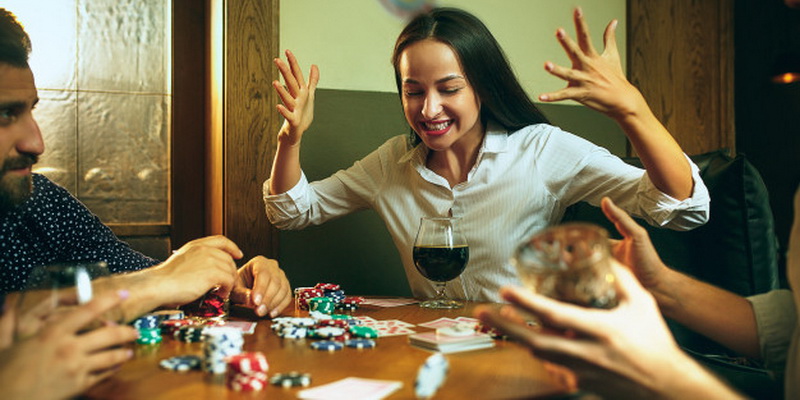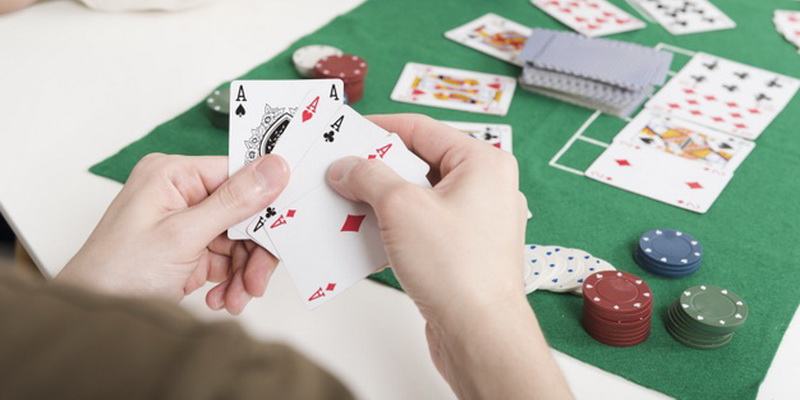Content
Those for whom poker rules are no strangers to the fast-moving nature of poker chips in tournaments. After the first win, they no longer match their original values. Why does this happen? In this article, we will try to calculate the specific value of poker chips in a particular tournament phase or situation.
Poker tournament and its structure
In this article, we will look specifically at this poker tournament. Poker games require an understanding of their terms, so here are the key details you will need to calculate poker chip values:
- 10 participants;
- buy-in - €10;
- 1000 chips to start;
- Prize structure: 50%/30%/20%;
- 1st prize - 50 euros;
- 2nd place - €30;
- 3rd place - €20.
Frequently asked questions
❓ Do poker chip values change during tournaments?
✓ Yes. Poker tournaments are a type of game in which the more chips a player has, the lower their value. Conversely, poker chips are worth more when a player has very few chips.
❓ When are the highest poker chip values in tournaments?
The value of a single poker chip is highest when the player has the fewest chips.
❓ When are the lowest poker chip values in tournaments?
The more chips a person has, the more the value per chip decreases.
❓ How do I calculate the value of one chip?
Let's say we have 100 chips. We paid €10 for them. So we divide the amount paid by the number of tokens bought. 10/100=0.1 euro.
❓ Can I buy as many chips as I want during tournaments?
❌ No. All players in the tournament must buy the same amount of chips.
The value of poker chips at the start and end of the tournament
Poker tournaments require all players to buy the same number of chips each time. Specifically, people pay a certain amount of money and receive a set amount of chips in return. In this case, at the start of the tournament, each chip is worth €10/1000 chips = €0.01.

If our poker hands by strength often the best and winning first place, we would collect a total of 10 000 chips and win €50. So the value of one chip at the end of the tournament would be: €50 / €10 000 = €0.005. This means that the value of the chip at the end of the tournament has been doubled.
The value of poker chips with multiple players remaining
Let's see how things change when there are only 4 players left: A, B, C and D. They have 4000, 3000, 2000, 1000 chips respectively. Let's consider what are the values of the poker chips each person has in this case?
We calculate the probability of each poker player finishing in first place.

It's easy to do. Simply calculate how many chips each person has. We'll express it as a percentage. So players A, B, C, D have 40%, 30%, 20%, 10% of total chips respectively. Therefore, the probabilities of taking first place are as follows:
- Player A - 40%;
- Player B - 30%;
- Player C - 20%;
- Player D - 10%.
The probabilities of all poker players finishing in first place:
| Players | Amount of chips | Probability of winning 1st place | Probability of winning 2nd place | Probability of winning 3rd place | Probability of winning 4th place |
| A | 4000 | 40% | ? | ? | ? |
| B | 3000 | 30% | ? | ? | ? |
| C | 2000 | 20% | ? | ? | ? |
| D | 1000 | 10% | ? | ? | ? |
We find out the chances of each poker player finishing in second place.
There are three ways for Player A to qualify for second place:
- BA - Player B wins first place, Player A wins second place;
- CA - Player C wins first place, Player A wins second place;
- DA - Player D wins first place, Player A wins second place.
Calculate the probabilities of all the above options. Then add them together to get the probability of Player A coming second.
- Option BA. This will happen if Player B wins first place. The probability of this event is 30%. In this case, Player A will win against the other players: 4000/(4000+2000+1000) = 4000/7000. So BA = 0.3*(4000/7000) ~ 17.14%. We calculate the other options in a similar way.
- CA = 0.2*(4000/(4000+3000+1000)) = 0.2*(4000/8000) ~ 10%
- DA = 0.1*(4000/(4000+3000+2000)) = 0.1*(4000/9000) ~ 4.4%

Therefore, the probability that A will win second place is: A = 17.4% + 10% + 4.4% = 31.8%. Answer: 31.8%.
There are three ways for a B player to qualify for second place:
- AB - Player A wins first place, Player B wins second place;
- AC - Player C wins first place, Player B wins second place;
- AD - Player D wins first place, Player B wins second place.
- AB = 0.4*(3000/(3000+2000+1000)) = 0.4*(3000/6000) = 20 %
- CB = 0.2*(3000/(4000+3000+1000)) = 0.2*(3000/8000) = 7.5 %
- DB = 0.1*(3000/(4000+3000+2000)) = 0.1*(3000/9000) ~ 3.3 %
Thus, the probability of Player B winning second place is: B = 20% + 7.5% + 3.3% = 30.8%. Answer: 30.8%.

There are three ways for a C player to qualify for second place:
- AC - Player A wins first place, Player C wins second place;
- BC - Player B wins first place, Player C wins second place;
- DC - Player D wins first place, Player C wins second place.
- AC = 0.4*(2000/(3000+2000+1000)) = 0.4*(2000/6000) ~ 13.33 %
- BC = 0.3*(2000/(4000+2000+1000)) = 0.3*(2000/7000) ~ 8.57%
- DC = 0.1*(2000/(4000+3000+2000)) = 0.1*(2000/9000) ~ 2.2 %
Thus, the probability of Player C winning second place is: B = 13.33% + 8.57% + 2.2% = 31.8%. Answer: 24.1%
The probability of Player D finishing in second place is the easiest to calculate. Simply subtract the probabilities of the other players finishing in second place from 100%: 100% - 31.8% - 30.8% - 24.1% = 13.3%. Answer: 13.3%
The probabilities of all poker players finishing in second place:
| Players | Amount of chips | Probability of winning 1st place | Probability of winning 2nd place | Probability of winning 3rd place | Probability of winning 4th place |
| A | 4000 | 40% | 31.8% | ? | ? |
| B | 3000 | 30% | 30.8% | ? | ? |
| C | 2000 | 20% | 24.1% | ? | ? |
| D | 1000 | 10% | 13.3% | ? | ? |
3. Calculate the probabilities of all poker players to win third place.
There are six ways for an A player to reach third place:
- BCA; 2. CBA; 3. BDA; 4. DBA; 5. CDA; 6. DCA.
Add up the probabilities of all the options to get the overall probability of Player A finishing in third place.
- BCA. The probability of the BC option occurring is 8.57%. Thus, Player A will win third place with probability 0.0857*(4000/(4000+1000))=0.0857*(4000/5000)~6.87%. We calculate the other options similarly.
- CBA=0.075*(4000/(4000+1000))=6%
- BD=0.3*(1000/(4000+2000+1000))~4.29%
- BDA=0.0429*(4000/(4000+2000))~2.86%
- DBA=0.033*(4000/4000+2000))=2.2%
- CD=0.2*(1000/(4000+3000+1000))=2.5%
- CDA=0.025*(4000/(4000+3000))~1.43%
- DCA=0.022*(4000/(4000+3000))~1.26%
Thus, the overall probability of an A poker player finishing in third place is: A=6.87%+6%+2.86%+2.2%+1.43%+1.26%=20.62%

There are six ways for a B player to qualify for third place:
- ACB; 2. CAB; 3. ADB; 4. DAB; 5. CDB; 6. DCB.
Add up the probabilities of all the options to find the total probability that Player B has of finishing in third place.
- ACB=0.1333*(3000/(3000+1000))~10%
- CAB=0.1*(3000/(3000+1000))=7.5%
- AD=0.4*(1000/(3000+2000+1000))~6.67
- ADB=0.0667*(3000/(3000+2000))~4%
- DAB=0.044*(3000 /(3000+2000))=2.64%
- CD=0.2*(1000/(4000+3000+1000))=2.5%
- CDB=0.025*(3000/(3000+4000))~1.07%
- DCB=0.022*(3000/(3000+4000))~0.94%
The total probability of Poker Player B finishing in third place is: B=10%+7.5%+4%+2.64%+1.07%+0.94%=26.15%

There are six ways for Player C to qualify for third place:
- BAC; 2. ABC; 3. BDC; 4. DBC; 5. ADC; 6. DAC.
Add up the probabilities of all the options to get the total probability of Player C finishing in third place.
- BAC=0.1714*(2000/(2000+1000))~11.43%
- ABC=0.2*(2000/(2000+1000))~13.13%
- BD=0.3*(1000/(4000+2000+1000))~4.29%
- BDC=0.0429*(2000/(4000+2000))=1.43%
- DBC=0.033*(2000/(4000+2000))=1.1%
- AD=0.4*(1000(/3000+2000+1000))=6.67%
- ADC=0.067*(2000/(2000+1000))~4.47%
- DAC=0.044*(2000/(3000+2000))=1.76%
This is the total probability of poker player C finishing in third place: C=11.43%+13.13%+1.43%+1.1%+4.47%+1.76%=33.32%
The probability of Player D finishing in third place is calculated as follows. Subtract the probabilities of the other players from 100%: 100% - 20.62% - 26.15% - 33.32% = 19.91%. Answer: 19.91%
The probabilities of all poker players finishing in third place:
| Players | Amount of chips | Probability of winning 1st place | Probability of winning 2nd place | Probability of winning 3rd place | Probability of winning 4th place |
| A | 4000 | 40% | 31.8% | 20.62% | ? |
| B | 3000 | 30% | 30.8% | 26.15% | ? |
| C | 2000 | 20% | 24.1% | 33.32% | ? |
| D | 1000 | 10% | 13.3% | 19.91% | ? |
Calculate the probabilities of all poker players to win fourth place.
Subtract the probability of that player finishing in the other places from 100% to get the probability of finishing in fourth place.
- The probability of Poker Player A finishing in fourth place: 100%-40%-31.8%-20.62%=7.58%
- The probability of Poker Player B finishing in fourth place: 100%-30%-30.8%-26.15%=13.05%
- The probability of Poker Player C finishing in fourth place: 100%-30%-24.1%-33.32%=12.58%
- The probability of a D poker player finishing in fourth place: 100%-10%-13.3%-19.91%=56.79%
The probabilities of all poker players getting to certain places:
| Players | Amount of chips | Probability of winning 1st place | Probability of winning 2nd place | Probability of winning 3rd place | Probability of winning 4th place |
| A | 4000 | 40% | 31.8% | 20.62% | 7.58% |
| B | 3000 | 30% | 30.8% | 26.15% | 13.05% |
| C | 2000 | 20% | 24.1% | 33.32% | 12.58% |
| D | 1000 | 10% | 13.3% | 19.91% | 56.79% |
5. Calculate the value of the poker chips held by the players.
The value of players' poker chips:
- A poker player = 0.4 * 50 euros + 0.318 * 30 euros + 0.2062 * 20 euros ~ 33.66 euros
- Poker Player B = 0.3 * €50 + 0.308 * €30 + 0.2615 * €20 = €29.47
- C poker player = 0.2 * 50 euros + 0.241 * 30 euros + 0.3332 * 20 euros ~23.89 euros
- D poker player = 0.1 * 50 euros + 0.133 * 30 euros + 0.1991 * 20 euros ~ 12.97 euros
We have received a table:
| Players | Amount of chips | Prize places | Value of chips | Value per chip |
| A | 4000 | 1st prize: 50 euros | 33.66 euros | 0.008415 euros |
| B | 3000 | 2nd prize: €30 | 29.47 euros | ~0.009823 euros |
| C | 2000 | 3rd prize: 20 euros | 23.89 euros | 0.011945 euros |
| D | 1000 | 4th place: 0 euros | 12.97 euros | 0.01297 euros |
As we can see from the table below, the values of poker chips change throughout the tournament. The more poker chips you have, the lower the value per poker chip. Conversely, the fewer poker chips you have, the higher the value of one poker chip.
Don't forget that poker tournament Originally at Poker chip values are the same for all players. The lowest poker chip value is at the end of the tournament, when all the poker chips are in one person's hands. Poker chip values are a measure of whether and how much a game is worth playing for. Either way, the effort pays off!
